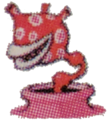Piranha Plorp
| Piranha Plorp | |
|---|---|
 Sprite from Mario & Luigi: Bowser's Inside Story + Bowser Jr.'s Journey | |
| First appearance | Mario & Luigi: Bowser's Inside Story (2009) |
| Latest appearance | Mario & Luigi: Bowser's Inside Story + Bowser Jr.'s Journey (2018) |
| Variant of | Piranha Plant |
Piranha Plorps are Piranha Plants that have a head that resembles a human heart, and a vein as a stalk. They are found inside Bowser's body in Mario & Luigi: Bowser's Inside Story and its remake Mario & Luigi: Bowser's Inside Story + Bowser Jr.'s Journey, encountered in the Energy Hold. They spit poison at Mario and Luigi. One of its attacks includes fogging the bottom screen and spitting red and green blobs of poison at the top screen. The color of these blobs indicates which Bro. will get hit: red for Mario, and green for Luigi. The attack can be countered by using the hammer. The Piranha Plorp will also try spitting a purple stream of poison at the bros. The number of lumps that rise up its throat indicates how many passes the jet of goo will make. This attack is avoided by jumping. If Mario and Luigi are hit by this attack, there is a high possibility of becoming Poisoned. The fastest way to defeat one is by using Fire Flowers, as they are weak to fire.
In Super Smash Bros. Ultimate, Piranha Plorps are mentioned briefly by Viridi during Palutena's Guidance dialogue for Piranha Plant.
Its name is a portmanteau of "Piranha Plant" and "blorp", an onomatopoeic that suggests the splashing from a volume of semiliquid material (e.g. blood, which is normally transported through veins and the heart; or poison, which the Piranha Plorp uses to attack with).
Statistics
Mario & Luigi: Bowser's Inside Story
| Mario & Luigi: Bowser's Inside Story enemy | ||||||||
|---|---|---|---|---|---|---|---|---|
| Piranha Plorp | ||||||||

|
HP | 165 (248) | POW | 56 (140) | DEF | 52 (78) | SPEED | 33 (50) |
| Coins | 55 (83) | Level | 17 | Fire | Critical | Burn? | Half | |
| Role | Common | Battled by | Mario and Luigi | Location(s) | Energy Hold | Dizzy? | Half | |
| Stat down? | Half | KO? | Half | Experience | 140 | Item drop | Super Mushroom - 9.0% Softener Gloves - 1.0% | |
| Notice: The second set of numbers next to the enemy's HP, POW, DEF, SPEED and Coins are stat increases from the Challenge Medal accessory; a 50% increase for HP, DEF, SPEED and Coins earned, and a 150% increase for POW. | ||||||||
Mario & Luigi: Bowser's Inside Story + Bowser Jr.'s Journey
| Mario & Luigi: Bowser's Inside Story + Bowser Jr.'s Journey enemy | ||||||||||
|---|---|---|---|---|---|---|---|---|---|---|
| Piranha Plorp | ||||||||||

|
HP | 165 | POW | 85 | DEF | 54 | SPEED | 29 | Experience | 140 |
| Fire | Critical | Jump | Normal | Hammer | Normal | Battled by | Mario & Luigi | Coins | 55 | |
| Burn | 0,5x | Dizzy | 0,5x | Stat down | 0,5x | Speed down | 0,5x | Item drop | Super Mushroom - 25% Softener Gloves - 20% | |
| Level 17 | Location(s) | Energy Hold | ||||||||
Gallery
Artwork from the Mario & Luigi: Bowser's Inside Story Prima guide
Names in other languages
| Language | Name | Meaning | Notes |
|---|---|---|---|
| Dutch | Piranha Plorp[?] | - | |
| French (NOA) | Piranhacide[?] | From "Piranha" and "acide" (acid) | |
| French (NOE) | Piranha Vénéna[?] | Venomous Piranha | |
| German | Giftnebel-Piranha[?] | Poison Fog Piranha | |
| Italian | Pianta Tossica (Mario & Luigi: Bowser's Inside Story) Scrigno Maligno (Super Smash Bros. Ultimate)[?] |
Toxic Plant Malignant Chest |
|
| Korean | 독끔플라워[?] Dokkkeum Peullawo |
Play on "뻐끔플라워" (Ppeokkeum Peullawo, Piranha Plant) and "毒" (dok, "venom" in Sino-Korean) | |
| Russian | Пиранья-пендикс[?] Piran'ya-pendiks |
From "Растение-пиранья" (Racteniye-piran'ya, Piranha Plant) and "аппендикс" (appendiks, appendix) | |
| Spanish (NOA) | Pirañácido[?] | From "Piraña" (Piranha) and "ácido" (acid) | |
| Spanish (NOE) | Toxiraña[?] | Portmanteau of "Planta Piraña" (Piranha Plant) and "toxina" (toxin) |
